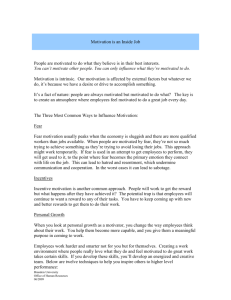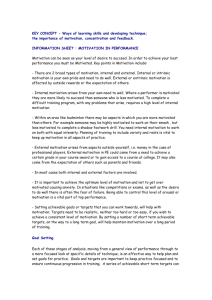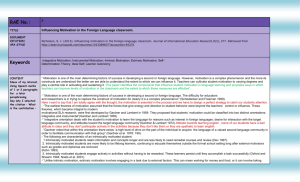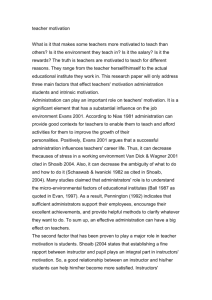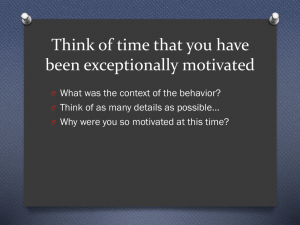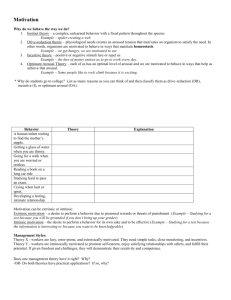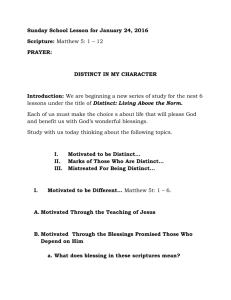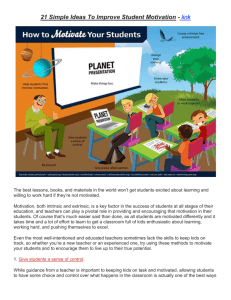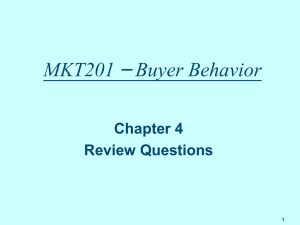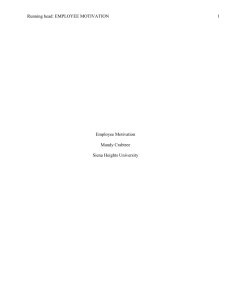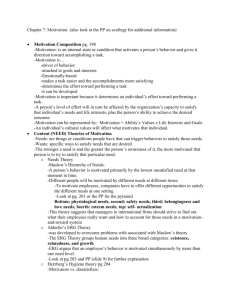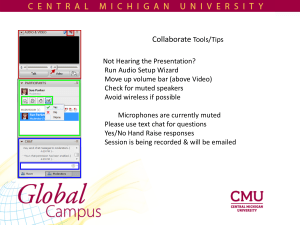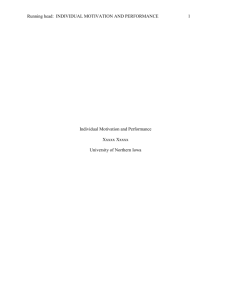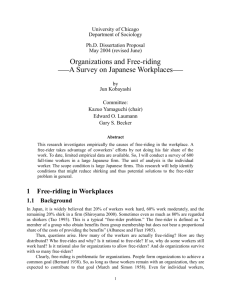Increasing Student Motivation
advertisement
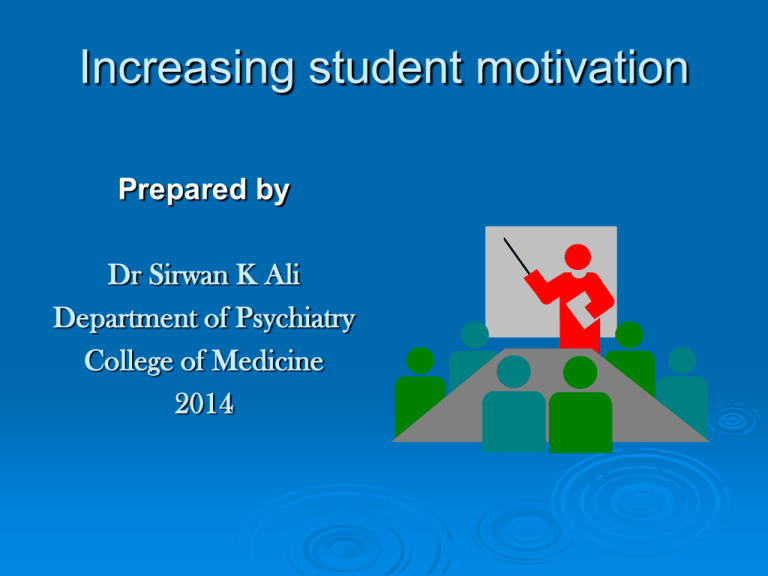
Increasing student motivation Prepared by Dr Sirwan K Ali Department of Psychiatry College of Medicine 2014 A medical college student complained that he lack interest in presence in Dr ….. lectures, He will copy his lectures from other colleague students. When other students asked him why? He said……… Lecture out line • • • • • • Introduction Definition Student motivation categories How to increase students motivation Factors affecting student motivation Conclusion Student Motivation How do I motivate students to learn? Educators on Student Motivation “There is and there can be no teaching where the attention of the student is not secured. The teacher who fails to get the attention of his students, fails totally.” Hughes- 1880 Educators on Student Motivation “A teacher who is attempting to teach without inspiring the student with a desire to learn is hammering cold iron.” Horace Mann Introduction Motivation, a force that energizes and directs behavior toward a goal, perceived as one of the most important psychological concepts in education. Student motivation is critical for learning, and several researchers have found a positive and robust correlation between motivation and achievement. Introduction Student motivation may be the single most-powerful indicator of a student’s likelihood of persisting. One of the major sources of stimulation of motivation is the teacher. His enthusiasm and values have much to do with his students' interest in the subject matter. Why “Enthusiasm”? “It makes students want to learn.” “It shows teacher cares about whether or not students do well.” “If he is enthusiastic, then they get curious about what he’s so excited about…” One of the characteristics of “good” teachers is they motivate their students by their own excitement Student Motivation In general terms, student motivation "refers to a student's willingness, need, desire and compulsion to participate, and be successful in, the learning process”. Less motivated students, on the other hand,” are passive, do not try hard, and give up easily in the face of challenges" Student motivation categories Extrinsic motivation: A student can be described as extrinsically motivated when he or she engages in learning "purely for the sake of attaining a reward or for avoiding some punishment" Student motivation categories Intrinsic motivation: A student can be described as intrinsically motivated when he or she is motivated from within. Intrinsically motivated students actively engage themselves in learning out of curiosity, interest, or enjoyment, or in order to achieve their own intellectual and personal goals. Intrinsically motivated students • Earn higher grades on average, than extrinsically motivated students. • Are more likely to feel confident about their ability to learn new material. • Use "more logical information-gathering and decision-making strategies" than do extrinsically motivated students. Intrinsically motivated students • Are more likely to engage in "tasks that are moderately challenging, whereas extrinsically oriented students gravitate toward tasks that are low in degree of difficulty”. • Are more likely to persist with and complete assigned tasks. • Are more likely to be lifelong learners and continuing to educate themselves outside the formal setting. What about Motivation? The big question in the mind of most faculty members is how to increase student motivation? In the minds of many the other question is how to maintain student motivation? The answer to these two questions requires achieving a balance between student internal and external motivation. How to increase Students’ Motivation? suggestions for increasing students' motivation to learn: • Establish a sense of inclusion so that students feel respected and connected to one another. • Use relevance and choice to create a sense of self-determination. • Engage and challenge students to enhance meaning. • Create a sense of competence in students. How to increase Students’ Motivation? • Establish low stress learning environments. Such environment is more likely to foster deep learning. • Realize that teaching is more than simply “laying out the feast of knowledge” and hoping that students will be motivated enough to participate. • Treat students as co-learners. Act more to increase Students’ Motivation? • • • • Reward success and keep hopes high. Involve students in setting their own objectives. Draw on students’ relevant experience. Ensure course materials relate to students' lives ( Real World Problems). • Assign challenging but achievable tasks for all students. Increase Students’ Motivation? • Listen to student voices and address their needs in an encouraging manner. Ask students for feedback on your teaching and value their input. • Emphasize active learning. Design projects that allow students to share new knowledge with others. • Use extrinsic rewards sparingly. Rewards should only be given when they are clearly deserved. How to increase Students’ Motivation? • Respond positively to student questions, and praise students verbally for work well done. • Work to build quality relationships with all students. • Show less emphasis on grades and more on learning, understanding and participation. • Evaluate student work as soon as possible and be sure that feedback is clear and constructive. Factors affecting Students' Motivation Students go to the classroom with a number of thoughts in their minds and experiences that influence their learning and perception of what they learn. Some of these thoughts are conflicting and some are supporting each other. It is a challenge to keep these issues in mind in trying to keep positive attitude of the student towards his learning. Factors affecting Students' Motivation These factors include: • Pre-college experience. • Surrounding environment Campus life Social life • In-class experience Curriculum Faculty Grades Facilities Conclusions Students can and will operate in a more self-motivated and responsible manner if they are taught in an environment that fosters success. The teacher who attempts to teach without inspiring his student with a desire to learn is hammering a cold iron. Conclusions Grades have a place in motivating students but grades should not be overly emphasized. Try to make the material appear meaningful and somewhat interesting. Conclusions Drivers for motivation vary among individuals; some are motivated through rewards and incentives, others through challenge, and others through competition. Try to utilize the suitable means as appropriate. Thank you…

